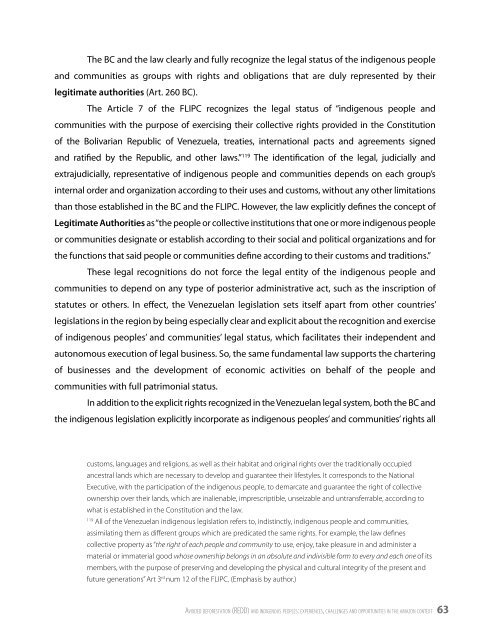Avoided Deforestation (REDD) and Indigenous ... - Amazon Fund
Avoided Deforestation (REDD) and Indigenous ... - Amazon Fund
Avoided Deforestation (REDD) and Indigenous ... - Amazon Fund
Create successful ePaper yourself
Turn your PDF publications into a flip-book with our unique Google optimized e-Paper software.
The BC <strong>and</strong> the law clearly <strong>and</strong> fully recognize the legal status of the indigenous people<br />
<strong>and</strong> communities as groups with rights <strong>and</strong> obligations that are duly represented by their<br />
legitimate authorities (Art. 260 BC).<br />
The Article 7 of the FLIPC recognizes the legal status of “indigenous people <strong>and</strong><br />
communities with the purpose of exercising their collective rights provided in the Constitution<br />
of the Bolivarian Republic of Venezuela, treaties, international pacts <strong>and</strong> agreements signed<br />
<strong>and</strong> ratified by the Republic, <strong>and</strong> other laws.” 119 The identification of the legal, judicially <strong>and</strong><br />
extrajudicially, representative of indigenous people <strong>and</strong> communities depends on each group’s<br />
internal order <strong>and</strong> organization according to their uses <strong>and</strong> customs, without any other limitations<br />
than those established in the BC <strong>and</strong> the FLIPC. However, the law explicitly defines the concept of<br />
Legitimate Authorities as “the people or collective institutions that one or more indigenous people<br />
or communities designate or establish according to their social <strong>and</strong> political organizations <strong>and</strong> for<br />
the functions that said people or communities define according to their customs <strong>and</strong> traditions.”<br />
These legal recognitions do not force the legal entity of the indigenous people <strong>and</strong><br />
communities to depend on any type of posterior administrative act, such as the inscription of<br />
statutes or others. In effect, the Venezuelan legislation sets itself apart from other countries’<br />
legislations in the region by being especially clear <strong>and</strong> explicit about the recognition <strong>and</strong> exercise<br />
of indigenous peoples’ <strong>and</strong> communities’ legal status, which facilitates their independent <strong>and</strong><br />
autonomous execution of legal business. So, the same fundamental law supports the chartering<br />
of businesses <strong>and</strong> the development of economic activities on behalf of the people <strong>and</strong><br />
communities with full patrimonial status.<br />
In addition to the explicit rights recognized in the Venezuelan legal system, both the BC <strong>and</strong><br />
the indigenous legislation explicitly incorporate as indigenous peoples’ <strong>and</strong> communities’ rights all<br />
customs, languages <strong>and</strong> religions, as well as their habitat <strong>and</strong> original rights over the traditionally occupied<br />
ancestral l<strong>and</strong>s which are necessary to develop <strong>and</strong> guarantee their lifestyles. It corresponds to the National<br />
Executive, with the participation of the indigenous people, to demarcate <strong>and</strong> guarantee the right of collective<br />
ownership over their l<strong>and</strong>s, which are inalienable, imprescriptible, unseizable <strong>and</strong> untransferrable, according to<br />
what is established in the Constitution <strong>and</strong> the law.<br />
119 All of the Venezuelan indigenous legislation refers to, indistinctly, indigenous people <strong>and</strong> communities,<br />
assimilating them as different groups which are predicated the same rights. For example, the law defines<br />
collective property as “the right of each people <strong>and</strong> community to use, enjoy, take pleasure in <strong>and</strong> administer a<br />
material or immaterial good whose ownership belongs in an absolute <strong>and</strong> indivisible form to every <strong>and</strong> each one of its<br />
members, with the purpose of preserving <strong>and</strong> developing the physical <strong>and</strong> cultural integrity of the present <strong>and</strong><br />
future generations” Art 3rd num 12 of the FLIPC. (Emphasis by author.)<br />
Av o i d e d d e f o re s t A t i o n (redd) A n d i n d i g e n o u s p e o p l e s: experiences, chAllenges A n d o p p o r t u n i t i e s in t h e A m A zo n c o n t e x t 63
















